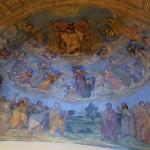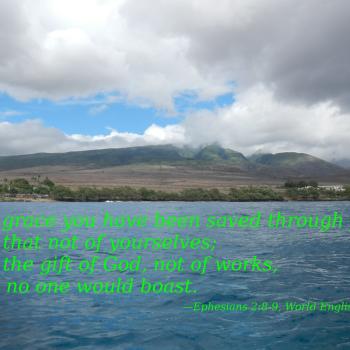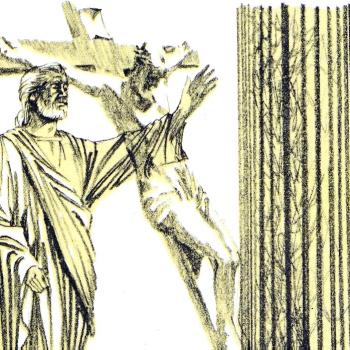
The plurality of God’s works with creation, the plurality of the divine energies, do not undermine the simplicity of God. Rather, they help preserve it by reminding us that what we apprehend of God is not God in essence. That is, since we apprehend God in a diversity of ways, using many names to talk about the divine nature, it would be easy to think this means God is composed of parts. The reality is, however, that God is simple, and the diversity of divine energies only comes from and out of that simplicity: “ ‘But the operations are varied, and the substance is simple.’ We say that from His operations we know our God; we do not undertake to approach His substance itself. His operations come down to us, but His substance remains inaccessible.”[1]
Our ability to apprehend God is made possible because God kenotically engages us through the divine energies. We truly know God even if we do not know the divine essence as it is in itself. Only God knows and comprehends the divine essence in that fashion. Anyone would claim that they know it as God knows it blasphemously suggests that they are equal to or greater than God. That God is one and simple, itself, is a part of the revelation we have of God, coming from the divine energies, so that the One is a proper title for God while God in essence even transcends such oneness, which is also how and why God, in simplicity, can be encountered in diverse kenotic activities without contradiction.
Just as the doctrine of the Trinity does not contradict divine simplicity, that is, just as the three persons do not divide the divine substance into parts, so the teaching of the divine energies does not undermine divine simplicity. This is because it is one and the same essence which lies behind the energies, and it is the greatness of that essence which leads to and allows for a diversity of energies for us to engage:
But since God is entirely present in each of the divine energies, we name Him from each of them, although it is clear that He transcends all of them. For, given the multitude of divine energies, how could God subsist entirely in each without any division at all; and how could each provide Him with a name and manifest Him entirely, thanks to indivisible and supernatural simplicity, if He did not transcend all these energies? [2]
God is one. God is simple. That simplicity is found and discerned and understood not through the essence, because we cannot know the essence, but through the energies or activities of God. We talk about them in plural because we know in and through the plurality of names which we predicate to God. This is how we work with God, this is how we apprehend God, and so, as St. Thomas Aquinas explained, there is nothing foolish in addressing God through such a plurality: “From this it is further evident that, although God is absolutely simple, it is not futile for our intellect to form enunciations concerning God in His simplicity by means of composition and division.” [3] Thus, “For although, as we have said above, our intellect arrives at the knowledge of God through diverse conceptions, it yet understands that what corresponds to all of them is absolutely one. “[4]
When we ponder divine simplicity, we should realize that this means God is one, and so, for God, the will and work of God is also one, even if our apprehension of them are diverse. The two should be understood as being one, unable to be separated from each other, reinforcing the truth that God is absolutely simple. This is why St. Gregory Palamas, while talking about the energies, can also indicate that they are one: “Obviously, my friend, the uncreated essence and the uncreated energy are inseparable from each other. For neither of them is ever seen as separate from the other. And so there is in essence and energy one uncreated divinity of the Father, the Son and the Holy Spirit.”[5]
We experience the activity of God in a variety manners, each, in its own turn, able to be said to be its own action or energy of God. Nonetheless, those actions, those energies, must be designated as eternal because God is eternal, engaging us through one unchanging, and therefore one unceasing action. While, to us, there appears to be changes in God’s will, and therefore, in God’s activities, we must realize that this is only a matter of perspective. Certainly, there is a kind of change going on, but what changes is not God, but us, and our engagement of that one eternal activity of God:
But if God’s activity is identical to his will that something be done by him, then can it be that, when he does something that was not previously done, can it be, I ask, that he wills something that he previously did not will? But he who is truly immutable cannot will himself to change. Therefore, he always willed what he willed once. Can it be then that he accomplished from eternity what is accomplished by his will, given that he willed that they be done from eternity? And if he accomplishes those things that are in the future, then can it be that he is still doing and will do those things that are already in the past and will no longer be in the future? Surely he does not preserve something by his activity in the same way as his will? [6]
God’s activity is one, but it is considered plural in relation to the way it engages the objects of creation. “God’s truth, then, could be known in these several ways. God is a single and simple essence which does not consist of any diversity of parts or accidents. But the Apostle says that in the plural, the invisible things of God, because God’s truth is known in several ways through the things which are made.” [7] This plurality does not undermine divine simplicity by making a multitude in God, because the plurality is only apparent. Thus, it is conventional truth to describe God’s activity in as being a plurality of activities. This is because, as Aquinas explained, we distinguish the acts in relation to their objects, not in relation to God’s simplicity: “For acts are distinguished according to their objects. If, then, the many objects that God wills caused a multitude in Him, it would follow that there was not in Him solely one operation of the will.”[8] And so, when talking about a plurality of uncreated energies, this plurality is as a result of the created natures which interact with God’s eternal, unchanging activity. St. Gregory Palamas, understanding this, made a similar point:
The divine supraessentiality is never named in the plural. But the divine and uncreated grace and energy of God is indivisibly divided, like the sun’s rays that warm, illumine, quicken and bring increase as they cast their radiance upon what they enlighten, and shine on the eyes of whoever beholds them. In the manner, then, of this faint likeness, the divine energy of God is called not only one but also multiple by the theologians. Thus St Basil the Great declares: ‘What are the energies of the Spirit? Their greatness cannot be told and they are numberless. How can we comprehend what precedes the ages? What were God’s energies before the creation of noetic reality?’ For prior to the creation of noetic reality and beyond the ages – for the ages are also noetic creations – no one has ever spoken or conceived of anything created. Therefore the powers and energies of the divine Spirit – even though they are said in theology to be multiple – are uncreated and are to be indivisibly distinguished from the single and wholly undivided essence of the Spirit.[9]
This is why the names we use to describe God are properly considered to be eternal names. We use them to describe the various uncreated energies which we encounter in our apprehension of God. We can, using some conventions, talk about their interaction with creation in such a way as to called them “created activities,” such as “created grace, but when we do this, we must understand this does not undermine their uncreated nature. If God’s energies were created, then God would be created. Thus, just as the relative diversity of acts to not undermine the singularity by which God acts, so the discussion of God’s interaction with creation as “created” must not be seen as literal and absolute but rather as metaphoric. Nonetheless, as people can easily misconstrue the notion of “created grace,” and with it, talk about “created energies,” when dealing with God, it is best to talk about such energies as uncreated. That way, there will be less change of confusion concerning the nature of the divine essence itself. For, as we apprehend God through God’s energies, if we think God’s energies are created, we can easily be led to believe God is created, undermining the integrity of the divine nature as a whole.
[1] St. Basil, “Letter 234” in Saint Basil: Letter. Volume 2 (186-368). Trans. Agnes Clare Way, CDP (New York: Fathers of the Church, 1955), 160.
[2] St. Gregory Palamas, The Triads. Trans. Nicholas Gendle (New York: Paulist Press, 1983), 95-6.
[3] St. Thomas Aquinas, Summa Contra Gentiles. Books One: God. Trans. Anton C Pegis (Notre Dame: University of Notre Dame Press, 1975), 150 [c36].
[4] St. Thomas Aquinas, Summa Contra Gentiles. Books One: God, 150 [c36].
[5] Saint Gregory Palamas, Dialogue Between and Orthodox and a Barlaamite. Trans. Rein Ferwerda (Binghamton, NY: CEMERS, 1999), 57.
[6] Richard of St Victor, “On the Trinity” in Victorine Texts in Translation: Trinity and Creation. Trans. Christopher P. Evans. Ed. Boyd Taylor Coolman and Dale M Coulter (Hyde Park, NY: New City Press, 2011), 244-5.
[7] Peter Lombard, The Sentences. Book 1: The Mystery of the Trinity. Trans. Giulio Silano (Toronto: Pontifical Institute of Medieval Studies, 2007), 20 [III-1].
[8] St. Thomas Aquinas, Summa Contra Gentiles. Books One: God, 250 [c77].
[9] St. Gregory Palamas, “Topics of Natural and Theological Science and on the Moral and Ascetic Life: One Hundred and Fifty Texts,” in The Philokalia: Volume IV. Trans. and ed. G.E. H. Palmer, Philip Sherrard, Kallistos Ware, et. al. (London: Faber and Faber, 1995), 377-8 [#68].
Stay in touch! Like A Little Bit of Nothing on Facebook.
If you liked what you read, please consider sharing it with your friends and family!

















